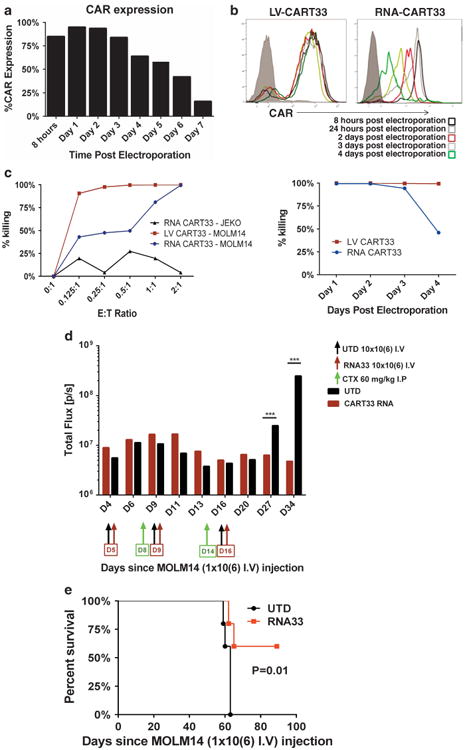Figure 7.

RNA-modified CART33 cells have transient CAR expression and result in significant in vitro and in vivo activity. (a) Transient expression of CAR following RNA modification. RNA-modified CAR33 expression as correlated with time postelectroporation. CAR expression reaches the peak at 24 h postelectroporation and gradually decreases after that. (b) The mean fluorescence intensity (MFI) of CAR expression in mRNA CART33 compared with lentivirally transduced CART33. The MFI of CAR expression decreases with time postelectroporation, while there is stable expression of CAR in lentivirally transduced T cells. (c) RNA-CART33 treatment results in specific killing against MOLM14 that is comparable to LV-transduced CART33. RNA-modified CART33 and LV-transduced CART33 cells were incubated with the CD33-positive cell line MOLM14-luc and a control mantle cell lymphoma cell line JEKO-luc at different E:T ratios as indicated. Bioluminescence imaging was performed after 24 h as a measure of living cells. This experiment was repeated at different time points postelectroporation of T cells. Twenty-four hours postelectroporation, RNA CART33 resulted in the most specific killing of MOLM14 cell line (comparable to LV-transduced CART33) that decreased with time post electroporation. (d) RNA-CART33 therapy combined with lympho-depleting chemotherapy results in further reduction of leukemic burden in MOLM14-engrafted xenografts. NSG mice were injected with MOLM14-luc (1 × 106 intravenously (IV)) and imaged to confirm engraftment 4 days later. Mice were then randomized to receive either RNA-CART33 with cyclophosphamide or UTD cells with cyclophosphamide (60 mg/kg intraperitoneally). T cells were given at a dose of 10 ×106 IV on days 5, 9 and 16. Lympho-depleting doses of cyclophosphamide were given on days 8 and 14, prior to T-cell infusion. (e) RNA-CART33 treatment combined with lympho-depleting chemotherapy result in prolonged survival compared with control T cells with chemotherapy.
